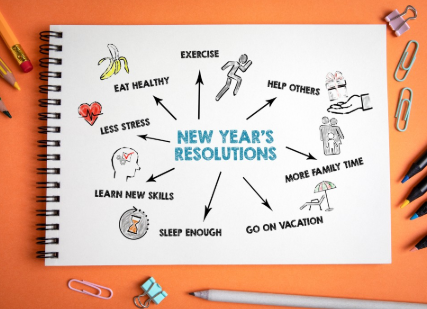As the clock strikes midnight on December 31st and we enter 2025, millions of people worldwide will pledge to better themselves in the coming year. These goals, known as New Year’s resolutions, range from personal health plans to professional ambitions. But what drives this widespread tradition, and why do so many resolutions dissolve before the month of January even ends?
The “fresh start” associated with New Year’s Day is a powerful motivator. Known as the “fresh start effect,” this phenomenon is rooted in the idea that marks in time—like the beginning of a new year—help people separate their past selves from who they want to be in the future. According to the PAR Learning Center, “Research on the fresh start effect show that creating these new mental periods of time helps individuals to put past periods of imperfections behind them and can help motivate aspirational behaviors that make it more likely to stick to those goals than ones that were made with no mental benchmarks.” This psychological reset makes it easier to envision change and commit to new habits.
The New Year also brings heightened optimism, as people believe the future holds untapped potential. Additionally, the collective enthusiasm surrounding resolutions creates a sense of accountability. When friends and family share their goals, it can inspire others to follow, creating a sense of community around self-improvement. Resolutions seem to be more popular with teens and young adults, according to the Pew Research Center, which found that 49% of young adults (aged 18-29) made a resolution in 2024.
Despite good intentions, studies show that approximately 80% of New Year’s resolutions fail, often by mid-February. Common reasons include:
- Unrealistic Goals: Setting vague or overly ambitious targets, such as “lose 50 pounds” or “be happier,” makes it difficult to sustain motivation.
- Lack of Planning: Resolutions often lack a concrete plan or steps for implementation.
- All-or-Nothing Thinking: Minor setbacks can lead to feelings of failure, causing individuals to abandon their goals entirely.
- Habitual Behavior: Changing ingrained habits requires consistent effort, which many underestimate.
Experts suggest several strategies to increase the likelihood of sticking to resolutions:
- Set SMART Goals: Ensure your goals are Specific, Measurable, Achievable, Relevant, and Time-bound. For example, instead of saying “exercise more,” commit to “go to the gym three times a week.”
- Focus on One Goal: Avoid spreading your energy too thin by prioritizing one resolution at a time.
- Break It Down: Divide your resolution into smaller, manageable steps to maintain momentum.
- Track Progress: Regularly monitor your achievements to stay motivated and adjust your approach if needed.
- Practice Self-Compassion: Accept setbacks as part of the process and focus on progress rather than perfection.
While January 1st may serve as a powerful motivator, psychologists emphasize that self-improvement isn’t confined to one day. Any moment can be an opportunity for a fresh start, whether it’s a new week, month, or even a significant life event.
Ultimately, the psychology of New Year’s resolutions highlights humanity’s innate desire for growth and transformation. By understanding the factors that influence success and failure, individuals can better harness the potential of this tradition to create lasting change.










